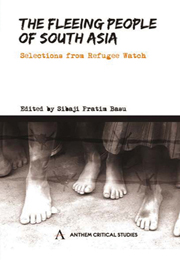Book contents
- Frontmatter
- Contents
- Acronyms and Abbreviations
- Foreword by Ranabir Samaddar
- Preface
- ETHICAL ISSUES
- LAWS
- SOUTH ASIA
- INDIA
- GENDER
- INTERVIEW/CORRESPONDENCE
- Introduction
- Voices from Exile – 1
- Voices from Exile – 2
- Daughter of Isis
- Right of Return
- Letters from a Palestinian Refugee Camp
- REPRESENTATIONS
- Index
Daughter of Isis
from INTERVIEW/CORRESPONDENCE
Published online by Cambridge University Press: 05 March 2012
- Frontmatter
- Contents
- Acronyms and Abbreviations
- Foreword by Ranabir Samaddar
- Preface
- ETHICAL ISSUES
- LAWS
- SOUTH ASIA
- INDIA
- GENDER
- INTERVIEW/CORRESPONDENCE
- Introduction
- Voices from Exile – 1
- Voices from Exile – 2
- Daughter of Isis
- Right of Return
- Letters from a Palestinian Refugee Camp
- REPRESENTATIONS
- Index
Summary
Dr Nawal El Saadawi, president of Arab Women's Solidarity Association, writer and activist, is used to controversies and confrontations. Despite bans on her work, she continues to defy set rules. Aditi Bhaduri meets her at the World social Forum in Mumbai.
‘I am a novelis, writer, doctor, a psychiatrist and president of Arab Women's Solidarity association. I live in Egypt’ – she describes herself. It does not do Dr Nawal El Saadawi justice, for she is much more. The ultimate humanist, she looks beyond the injuries specific to her own gender. So, she is a harsh critic of both female and male circumcision, Israel's treatment of the Palestinians, the Taliban's treatment of women in Afghanistan or the ‘allied’ Anglo-American onslaught on Iraq. And of course, she continues to challenge her own government and clergy of the Islamic society that she belongs to. She has been imprisoned, exiled, censored and her books banned. She was director of Health and Education in Cairo, but was dismissed in 1972 for her political writing and activities. In 1981, she was imprisoned by Anwar Sadat for writing against the government's policies and the growing religious fundamentalism in Egypt. A fatwa hangs over her head even now, but she continues to write and speak out against injustice, wherever she senses it. Many of her books are taught at prestigious western universities where she often lectures.
- Type
- Chapter
- Information
- The Fleeing People of South AsiaSelections from Refugee Watch, pp. 378 - 381Publisher: Anthem PressPrint publication year: 2009



